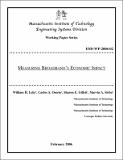| dc.description.abstract | Does broadband matter to the economy? Numerous studies have focused on whether there is a digital divide, on regulatory impacts and investment incentives, and on the factors influencing where broadband is available. However, given how recently broadband has been adopted, little empirical research has investigated its economic impact. This paper presents estimates of the effect of broadband on a number of indicators of economic activity, including employment, wages, and industry mix, using a cross-sectional panel data set of communities (by zip code) across the United States. We match data from the FCC (Form 477) on broadband availability with demographic and other economic data from the US Population Censuses and Establishment Surveys. We find support for the conclusion that broadband positively affects economic activity in ways that are consistent with the qualitative stories told by broadband advocates. Even after controlling for community-level factors known to influence broadband availability and economic activity, we find that between 1998 and 2002, communities in which mass-market broadband was available by December 1999 experienced more rapid growth in (1) employment, (2) the number of businesses overall, and (3) businesses in IT-intensive sectors. In addition, the effect of broadband availability by 1999 can be observed in higher market rates for rental housing in 2000. We compare state-level with zip-code level analyses to highlight data aggregation problems, and discuss a number of analytic and data issues that bear on further measurements of broadband’s economic impact. This analysis is perforce preliminary because additional data and experience are needed to more accurately address this important question; however, the early results presented here suggest that the assumed (and oft-touted) economic impacts of broadband are both real and measurable. | en_US |
